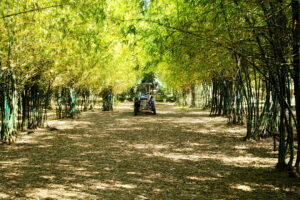FEMININE CARE startup Hiraya Pilipina created zero-plastic sanitary pads from bamboo to help fight menstrual period poverty and stigma in the Philippines.
Aside from helping girls, Dream bamboo pads are made of 100% natural material to reduce waste, Cleorine Faith C. Loque, founder and chief executive officer of Hiraya Pilipina, told BusinessWorld.
The startup has partnered with We Bleed Red Movement Philippines, a nongovernmental group, to reach out to Filipinas who need menstrual care products.
Ms. Loque said 1% of their profits from the sanitary pads are donated to women in need, especially victims of calamities.
Period poverty — lack of access to menstrual products, education, and hygiene facilities is a pressing Philippine issue, Budget Secretary Amenah F. Pangandaman said at a United Nations Commission on the Status of Women meeting in New York in March.
She said period poverty is a global community health concern that affects women and girls physically, emotionally, and academically.
“Period poverty is something that we need to address urgently, even as we address other issues such as financial literacy and financial inclusion of women,” she said, according to a statement from the Budget department.
In July, Hiraya Pilipina donated 500 boxes of compostable pads to victims of Typhoon Gaemi, locally known as Super Typhoon Carina, through We Bleed Red Movement.
“With initiatives from this NGO and Hiraya Pilipina, hopefully, we’re able to open more conversations around menstruation so we can educate more young girls regarding their periods as well,” Ms. Loque said.
She noted that unlike commercially available feminine pads with toxic chemicals that cause itchiness and irritation, their bamboo pads are composed of plastic-free materials such as breathable bamboo surfaces from China and biodegradable wood pulp from Germany.
“The sourcing of materials is very intentional as well because we want to ensure that it’s of the highest quality and it’s also really good for sensitive skin.”
Compostable materials used in the biodegradable pads decompose after 180 days, unlike traditional pads, which take 600 to 800 years, she added. — Almira Louise S. Martinez
